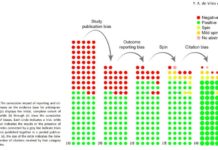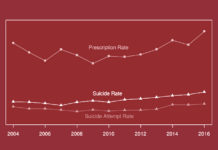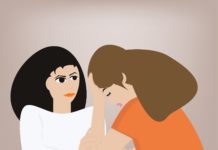Allen Frances and the Increasing Use of Antidepressants
Much of what Allen Frances says is sensible, but it would be more convincing if he would lay the responsibility for the present state of affairs squarely where it belongs: on psychiatry. I suggest, in all sincerity, that Dr. Frances abandon his attempt to absolve psychiatry from blame, and that he join the anti-psychiatry movement.
Pooling Data May Hide Negative Outcomes for Antidepressants
A new study, published in Psychological Medicine, found evidence for a specific type of publication bias distorting the evidence about antidepressant efficacy.
Systematic Review Finds Antidepressant Withdrawal Common and Potentially Long-lasting
Prominent researchers conduct a review of antidepressant withdrawal incidence, duration, and severity. Results lead to call for new clinical guidelines.
Reanalysis of STAR*D Study Suggests Overestimation of Antidepressant Efficacy
Reanalysis of the original primary outcome measure in the STAR*D study suggests STAR*D findings inflate improvement on antidepressant medication and exclusion criteria in conventional clinical trials results in overestimation of antidepressant efficacy.
Antidepressant Use Climbs as Patients Find it Difficult to Discontinue
Findings point to the role of withdrawal symptoms and prescriber practices in long-term antidepressant use.
Are Drug Side Effects Driving Depression Rates?
A new study finds that more than a third of Americans are taking prescription drugs that can cause depressive symptoms as a side-effect.
Researcher Challenges Clinical Effectiveness of Antidepressants
A new article in BMJ Evidence-Based Medicine addresses common misinterpretations of the efficacy research on antidepressants.
Adolescent Suicide and The Black Box Warning: STAT Gets It All Wrong
STAT recently published an opinion piece arguing that the black box warning on antidepressants has led to an increase in adolescent suicide.
It is easily debunked, and reveals once again how our society is regularly misled about research findings related to psychiatric drugs. STAT has lent its good name to a false story that, unfortunately, will resonate loudly with the public.
SSRI Exposure in Pregnancy Alters Fetal Neurodevelopment
Alterations in gray matter and white matter development found in infants of mothers taking SSRI antidepressants during pregnancy.
Publication Bias Inflates Perceived Efficacy of Depression Treatments, Study Finds
Researchers report the cumulative effects of major biases on the apparent efficacy of antidepressant and psychotherapy treatments.
Suicides Are Increasing – And So Are Antidepressant Prescriptions
Disturbingly, our study and others reveal that the black box warning is now ignored in many countries, since antidepressant prescriptions for children are on the rise again. Despite increasing certainty that antidepressants are ineffective and likely cause suicidal behavior in young people, psychiatry continues to claim that they reduce suicide risk.
Can Education Level Predict Prescription Drug Misuse in Young Adults?
A new study examines the extent to which patterns in prescription drug misuse and substance use disorder symptoms can be predicted by education level
Citizens Petition Calls for Sexual Side Effect Warnings
Researchers take action after study exposes enduring sexual dysfunction as a potential side effect of serotonin reuptake inhibiting antidepressants, 5α-reductase inhibitors, and isotretinoin.
Researcher Critiques Misleading Media Coverage of Lancet Antidepressant Meta-Analysis
The BMJ’s clinical editor takes issue with uncritical media coverage of antidepressant network meta-analysis, outlining reporting missteps.
Randomized Controlled Trials of Psychiatric Drugs Tell of Harm Done
The most important data in an RCT is not whether the drug provides a statistically significant benefit over placebo. The most important data is the “number needed to treat” calculation (NNT). For the person considering taking an antidepressant or an antipsychotic, the NNT data provides the “math” needed to weigh the potential benefit of taking the drug against the potential harm of doing so.
Antidepressants Are Not More Effective for Severe Depression, Study Finds
A new study, published in Acta Psychiatrica Scandinavica, found that antidepressant efficacy was not dependent on severity.
Study of Online Antidepressant Forums Reveals Long Lasting Withdrawal Effects
Effects of discontinuing SSRIs and SNRIs reported on an online forum indicate significant and long-lasting withdrawal symptoms.
Review of Pediatric Antidepressant Studies Finds Evidence of Benefit Lacking
Review of pediatric antidepressant studies finds the vast majority are negative on primary outcomes and an increased risk for suicidality.
Review Finds Lack of Evidence for Antidepressants in Treatment of Insomnia
Results from a Cochrane meta-analysis find that the common practice of prescribing antidepressants to treat insomnia is not supported by current evidence.
Tapering Strips Help People Discontinue Antidepressants
A new study by Peter Groot and Jim van Os has found that tapering strips help people successfully discontinue antidepressant medications.
Increasing Antidepressant Dose Does Not Improve Outcomes
A systematic review of literature and meta-analysis indicates that there is no clinically or statistically significant effect of antidepressant dose increase after nonresponse to initial treatment.
The Long-term Consequences of Antidepressant Use: An Interview with Michael Hengartner
Researchers at the University of Zurich, led by Michael Hengartner, recently reported that antidepressant use was associated with worse outcomes in patients followed over 30 years. Here Hengartner provides more information about the study methodology and their findings.
Usage of Depression Pills Almost Halved Among Children in Denmark
After a number of years with a steadily increasing sales curve, the number of children and adolescents in treatment with depression pills decreased by 41% in Denmark. Despite this welcome development, pharmaceutical companies and psychiatry professors continue to deceive the population and deny the facts about these drugs.
Bright Light Therapy More Effective Than Medication Alone for Bipolar Depression
A new randomized, double-blind, placebo-controlled trial has found bright light therapy to be a powerful intervention that could provide an alternative to medication for people with “bipolar depression.”
Existential Therapy Assists Patients Withdrawing From Psychiatric Drugs
Confronting existential anxiety through “Basal Exposure Therapy” shows promising results in people withdrawing from psychotropic drugs.

































